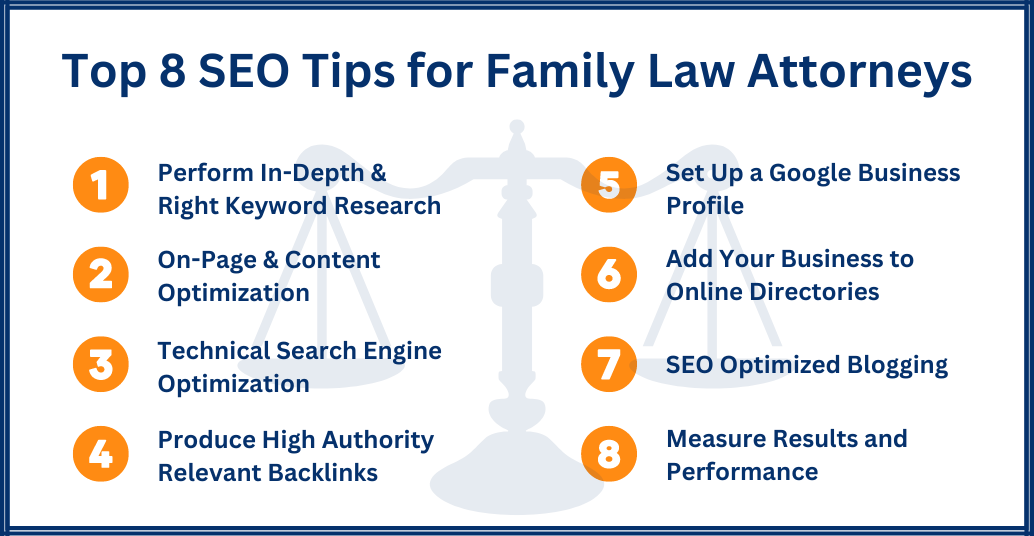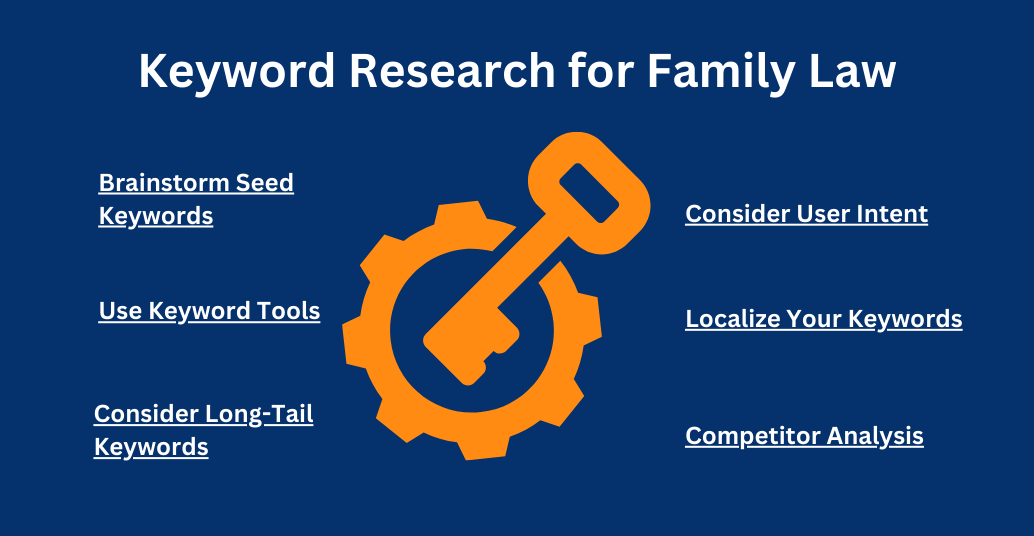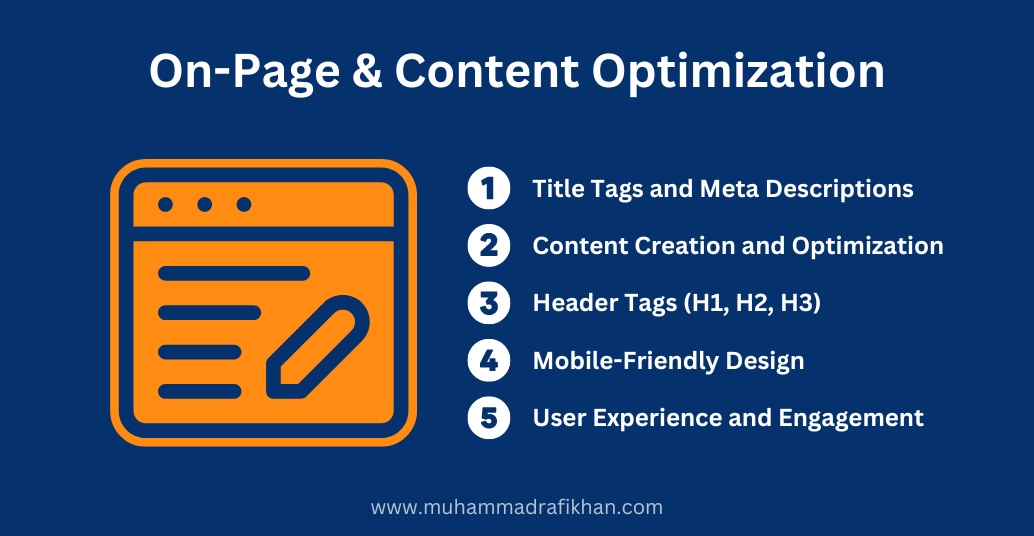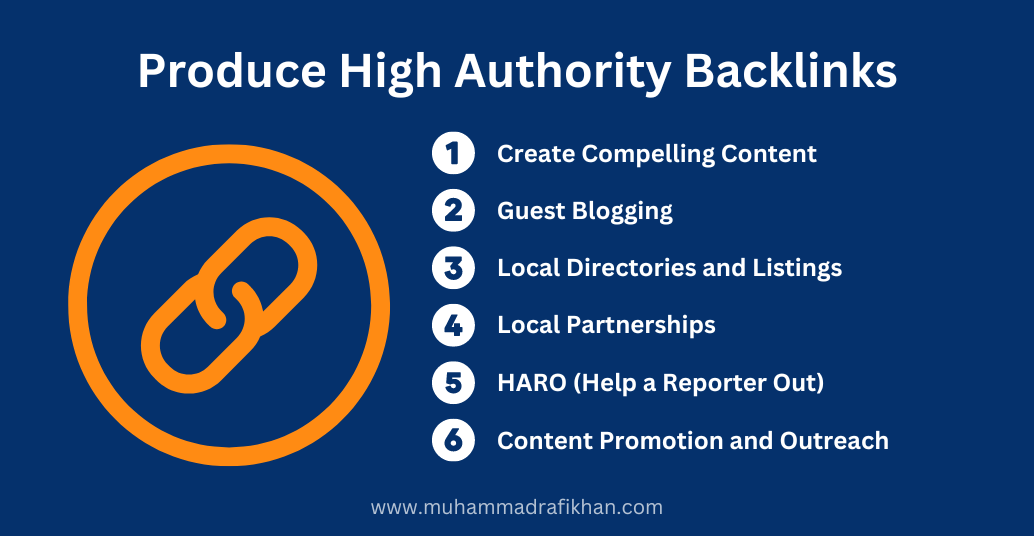Find in This Article
Top 8 SEO Tips for Family Law Attorneys
1. Perform In-Depth & Right Keyword Research
2. On-Page & Content Optimization
3. Technical Search Engine Optimization
4. Produce High Authority Relevant Backlinks
5. Set Up a Google Business Profile
6. Add Your Business to Online Directories
7. SEO Optimized Blogging
8. Measure Results and Performance
Conclusion

If you are a family law attorney or firm, implementing effective SEO strategies can significantly impact your website’s traffic and potential client base. SEO for family law involves optimizing your website to rank higher in search engine results pages for specific keywords and phrases relevant to your practice area. With higher search engine rankings, your website can attract more potential clients and generate more leads.
To achieve effective SEO for family law, it is crucial to conduct extensive keyword research to identify the keywords and phrases your target audience is using to search for family law services. Once you have identified these keywords, they should be strategically incorporated into your website’s content, titles, headings, and meta descriptions to improve your website’s visibility in search engine results pages.
In this article I’ll provide you with comprehensive insights into effective SEO strategies for family law firms. I’ll start by discussing the essential SEO fundamentals, including keyword research, content creation, and on-page optimization, and how they can be incorporated into your law firm’s website.
I am text block. Click edit button to change this text. Lorem ipsum dolor sit amet, consectetur adipiscing elit. Ut elit tellus, luctus nec ullamcorper mattis, pulvinar dapibus leo.
Top 8 SEO Tips for Family Law Attorneys
When it comes to attracting potential clients and staying ahead of the competition in the digital realm, implementing effective SEO strategies is essential for family law attorneys. To help you optimize your website and boost your online presence, here are the top 10 SEO tips specifically tailored for family law attorneys:
1. Perform In-Depth & Right Keyword Research
Keyword research is essential for family law and divorce lawyers because it enables them to understand the language and search queries used by their target audience. By identifying and incorporating relevant keywords into their website content, attorneys can improve their chances of appearing in search engine results when potential clients are seeking legal assistance or information related to family law matters. This targeted approach helps attract qualified traffic to their websites, increasing the likelihood of converting visitors into clients.

Moreover, it allows family law and divorce lawyers to stay ahead of the competition. By analyzing popular and industry-specific keywords, attorneys can uncover untapped opportunities and niche areas where they can differentiate themselves from other practitioners. By focusing on these keywords in their SEO strategies, lawyers can improve their website’s visibility, outrank competitors, and establish themselves as authoritative sources in the field. Ultimately, keyword research empowers family law and divorce lawyers to optimize their online presence, drive relevant traffic, and attract potential clients in a highly competitive digital landscape.
Here you’ll learn the proven methods to find the profitable keywords for family law attorneys and divorce lawyers:
-
Brainstorm Seed Keywords
Create a list of seed keywords based on your practice area. These are general terms or phrases that directly relate to family law and divorce law. For example, “family law attorney,” “divorce lawyer,” “child custody,” “alimony,” “property division,” etc.
-
Use Keyword Tools
Utilize keyword research tools like Google Keyword Planner, SEMrush, Moz Keyword Explorer, or free Ahrefs keyword generator to expand your list of keywords. Enter your seed keywords and explore the suggestions provided by these tools. Look for keywords with high search volume, low competition, and relevance to your practice area.
-
Long-Tail Keywords
Identify long-tail keywords that are more specific and have lower search volume but higher intent. These keywords often indicate a searcher’s specific needs and can drive more targeted traffic to your website. For example, “child custody lawyer in Florida,” “how to file for divorce in New York,” etc.
-
Competitor Analysis
Analyze the websites of your competitors and identify the keywords they are targeting. This can provide valuable insights and help you discover new keyword opportunities. Tools like SEMrush and Ahrefs offer competitor analysis features to uncover competitor keywords.
-
Localize Your Keywords
If you target clients in specific geographic locations, incorporate location-based keywords into your research. Add your city, state, or region to relevant keywords to attract local clients. For example, “family law attorney in Florida.”
-
Consider User Intent
Think about the intent behind the keywords you’re targeting. Are searchers looking for general information, legal advice, or specific legal services? Align your keyword strategy with the intent to attract the right audience.
2. On-Page & Content Optimization
On-page SEO and content optimization can be highly beneficial for family law and divorce lawyers in terms of increasing their online visibility and attracting potential clients. By optimizing their website’s content and structure, lawyers can improve their search engine rankings and increase their website’s visibility to a wider audience.

Furthermore, by providing high-quality and informative content that addresses common legal questions, lawyers can establish themselves as experts in their field and build credibility and trust with potential clients. This can lead to increased engagement and conversions, ultimately resulting in more clients and business for the law firm. Overall, on-page SEO for family law is a crucial element to succeed in today’s digital landscape.
Here Are few but powerful strategies to optimize your on-page SEO and content for family law attorneys and divorce lawyers:
-
Title Tags and Meta Descriptions
Craft compelling and concise title tags and meta descriptions for each page of your website. Include relevant keywords and entice users to click through to your site by offering a clear value proposition and a call-to-action.
-
Content Creation and Optimization
Produce high-quality, informative, and engaging content that addresses common legal questions, provides insights, and showcases your expertise. Ensure your content is well-structured with subheadings, bullet points, and relevant internal and external links. Optimize the content by incorporating targeted keywords while maintaining readability and natural language.
-
Header Tags (H1, H2, H3)
Organize your content using proper header tags (H1, H2, H3). Utilize the H1 tag for the main page title and H2 and H3 tags for subheadings. Incorporate keywords naturally into your header tags to signal the relevance of your content to search engines.
-
Mobile-Friendly Design
Ensure your website is mobile-friendly and responsive, as more and more users access the internet through mobile devices. Optimize your site’s design and layout to provide a seamless user experience across various screen sizes and devices. This can positively impact your search engine rankings.
-
User Experience and Engagement
Focus on delivering a positive user experience by ensuring intuitive navigation, easy-to-read content, and clear calls-to-action. Encourage user engagement through comments, social sharing buttons, and interactive elements. Positive user signals such as longer dwell time and lower bounce rates can indirectly impact your search engine rankings.
By implementing these strategies, family law attorneys and divorce lawyers can improve their website’s visibility, attract relevant traffic, and ultimately generate more leads and clients. Regularly monitor and analyze your website’s performance, adjust your strategies as needed, and stay updated with the latest SEO trends to maintain a competitive edge in the digital landscape.
3. Technical Search Engine Optimization
Technical SEO for family law and divorce lawyers can be beneficial by improving website crawlability and indexing. Search engine bots need to be able to access and crawl your website’s pages effectively to index them in search results. By implementing technical SEO best practices such as optimizing robots.txt, XML sitemaps, and site structure, attorneys can ensure that their website’s pages are properly indexed, increasing the chances of appearing in relevant search queries.
It optimization also helps improve website speed and performance. Users expect fast-loading websites, and search engines take website speed into consideration when ranking search results. By optimizing aspects such as page load times, server response times, and image optimization, family law and divorce lawyers can provide a better user experience, reduce bounce rates, and increase the likelihood of retaining visitors and converting them into clients.
4. Produce High Authority Relevant Backlinks
Building high-quality, relevant backlinks is an essential aspect of off-page SEO for family law and divorce lawyers. These backlinks from authoritative and relevant websites signal to search engines that your website is trustworthy and valuable.

Here are some strategies to help you produce high authority relevant backlinks:
-
Create Compelling Content
Produce exceptional, informative, and valuable content that addresses common legal questions, provides insights, and offers unique perspectives on family law and divorce topics. When you publish high-quality content, other websites and influencers in the legal industry are more likely to link to it as a valuable resource.
-
Guest Blogging
Identify authoritative legal websites, blogs, and publications that accept guest contributions. Offer to write informative and well-researched articles on family law or divorce topics as a guest author, including a relevant backlink to your website within the content or author bio.
-
Local Directories and Listings
Submit your law firm’s website to reputable local directories and listings that specialize in legal services. These directories often allow you to include a website link along with your business information, helping you gain relevant backlinks from local sources.
-
Local Partnerships
Identify local businesses and professionals that complement the services you offer as a family law or divorce lawyer. Establish partnerships where you can provide valuable content or resources for their audience, such as guest blog posts, webinars, or workshops. In return, they may link back to your website as a trusted legal resource.
-
HARO (Help a Reporter Out)
Monitor HARO, a platform that connects journalists and industry experts. Respond to relevant queries related to family law and divorce, providing insightful and expert opinions. If your response is selected and featured in an article, you’ll receive a backlink to your website.
-
Content Promotion and Outreach
Actively promote your high-quality content by reaching out to relevant websites, blogs, and influencers in the legal industry. Inform them about your valuable resource and suggest that they consider linking to it if they find it useful for their audience.
5. Setup a Google Business Profile
Google Business Profile can be greatly beneficial to improve SEO for family law attorneys and firms. It enhances online visibility by appearing in local search results when potential clients search for family law services. The profile builds trust and credibility through client reviews and displays important information like contact details and website links. It also improves local SEO and allows for client engagement and communication. With mobile visibility and integration with Google Maps, the profile ensures easy accessibility for mobile users.
6. Add Your Business to Online Directories
Online business directories can play a significant role in improving the SEO of family law attorneys and divorce lawyers. These directories provide a platform for attorneys to list their services and provide valuable information to potential clients. By ensuring consistent and accurate listings across multiple directories, attorneys can enhance their online visibility and improve their search engine rankings. Search engines often consider online directories as authoritative sources, and having a presence in reputable directories can boost the credibility and trustworthiness of family law attorneys and divorce lawyers in the eyes of search engines.
The Google Business Profile provides insights and analytics into user behavior, enabling attorneys to make data-driven decisions and enhance their marketing efforts. By leveraging the benefits of a Google Business Profile, family law attorneys and divorce lawyers can effectively showcase their services, connect with potential clients, and grow their online goals with organic SEO.
7. SEO Optimized Blogging
SEO optimized blogging is essential for family law attorneys and divorce lawyers to improve their SEO for several reasons. Firstly, blogging provides an opportunity to create fresh and relevant content that aligns with the interests and concerns of potential clients. By regularly publishing informative and engaging blog posts on topics related to family law, divorce, child custody, alimony, and other relevant subjects, attorneys can establish themselves as authoritative and trustworthy sources of information. This not only helps to build credibility but also increases the chances of their blog posts being shared and linked to by other websites, which can significantly improve their search engine rankings.
Moreover, blogging allows family law attorneys and divorce lawyers to target specific keywords and phrases that potential clients are likely to search for. By conducting thorough keyword research and incorporating these terms strategically into their blog posts, attorneys can optimize their content for search engines. When their blog posts rank higher in search engine results, they have a better chance of attracting organic traffic from individuals who are actively seeking
legal advice and services related to family law and divorce. This can lead to increased website visibility, more qualified leads, and ultimately, improved SEO performance for attorneys.
8. Measure Results & Performance
For family law attorneys and divorce lawyers, understanding the effectiveness of their SEO campaigns provides valuable insights into the success of their online marketing efforts. By tracking key metrics such as website traffic, keyword rankings, conversion rates, and user engagement, they can assess the impact of their SEO initiatives. This data-driven approach allows them to identify areas of improvement, make informed adjustments to their strategies, and allocate resources effectively to maximize their online visibility.
Measuring SEO results and performance also helps family law attorneys and divorce lawyers identify which strategies are generating the most favorable outcomes. By analyzing the performance of specific keywords, landing pages, or content types, they can determine what resonates most with their target audience. This knowledge enables them to focus their efforts on high-performing elements, refine their messaging, and optimize their website to attract qualified leads and potential clients. Ultimately, by continuously measuring and analyzing SEO results, family law attorneys and divorce lawyers can stay ahead of the competition, refine their digital marketing efforts, and strengthen their online presence to drive sustainable growth in their practice.
Conclusion
In conclusion, implementing effective SEO strategies is crucial for family law attorneys and firms to enhance their online presence, attract potential clients, and generate leads. By conducting thorough keyword research, optimizing website content and structure, and implementing technical SEO best practices, attorneys can improve their search engine rankings and visibility. Moreover, producing high-quality, informative content and building relevant backlinks can establish them as experts in their field and increase their credibility with potential clients.
Additionally, leveraging tools like Google Business Profile, online directories, and optimized blogging can further enhance the SEO for family law attorneys. It’s essential for attorneys to continuously measure and analyze the results of their SEO efforts to identify areas of improvement and allocate resources effectively. By staying informed about the latest SEO trends and adapting their strategies accordingly, family law attorneys can maintain a competitive edge and achieve long-term success in the digital landscape.
FAQs About SEO for Family Law Attorneys
How does SEO work for family law attorneys?
SEO involves optimizing various aspects of a website, such as content, keywords, meta tags, and backlinks, to make it more appealing to search engines. This optimization helps the website rank higher in search results, making it easier for people to find when searching for family law services.
Is local SEO important for family law attorneys?
Yes, local SEO is vital for family law attorneys. Optimizing your website for local search can help you appear in local map listings and attract clients in your geographical area. This is especially important for attracting clients who are looking for legal services in their area.
Should I hire an SEO agency or do it myself as a family law attorney?
It depends on your expertise and available resources. Many family law attorneys choose to hire SEO professional or agencies because SEO requires continuous effort and expertise. However, some attorneys with digital marketing skills may choose to handle it themselves.


![SEO for Family Law Attorneys – 8 Easy & Quick Tips [2023]](https://muhammadrafikhan.com/wp-content/uploads/2023/04/Banner-image.png)


![DoFollow vs. NoFollow Links: Simple & Easy Guide [2023]](https://muhammadrafikhan.com/wp-content/uploads/2023/09/DoFollow-vs.-NoFollow-Links-Simple-Easy-Guide-2023-100x100.png)



